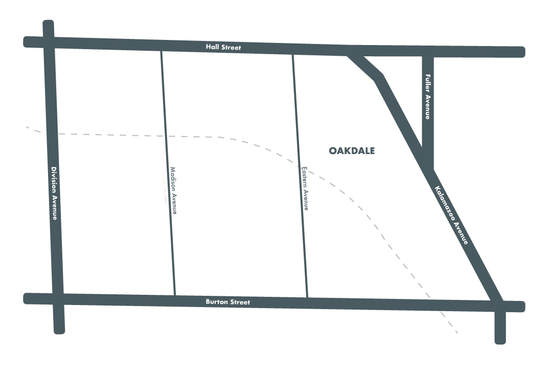|
The Grand Rapids Association of Pastors opened their third year of regular meetings at Madison Place on Thursday, September 21. Since we had a number of new pastors, including a number of pastors new to Grand Rapids, Rev. Kate Kooyman described who we are and what we do: This is a group exclusively for pastors so we can explore uniquely pastoral roles and perspectives on issues of justice. We want this group to be about unity. We want to meet across all lines--urban/suburban, denomination, culture, national origin. Even our meeting schedule is part of this unity: we want to be in each other's churches. We want to be about reconciliation. We know there are reasons we don't know each other and we have to be intentional about crossing lines of animosity to get to know each other. We meet to talk about justice issues, controversial issues to do with politics and policy, because the flourishing of our people is affected by these issues. Pastor Darrell Delaney, Campus Pastor of Madison Square Church, reminded us of Jeremiah 29:7, "And work for the peace and prosperity of the city where I sent you into exile. Pray to the LORD for it, for its welfare will determine your welfare." He pointed out that Madison finds it "a privilege and an honor to be in this community" and to work for its peace and prosperity, not only because they have good things to contribute, but also because the people of the community bring good things to them. This was a fitting opening to the meeting, since we were about to hear from Willie Patterson and Jon Ippel about the community development work of AmplifyGR, a nonprofit organization committed to bringing neighbors, local businesses, and community organizations together to "build a more safe, healthy, economically robust community." Amplify works in the Southeast neighborhoods of Boston Square, Cottage Grove, and Madison Square. The Executive Team invited AmplifyGR to talk to G-RAP because, as Rev. Kooyman said, "A lot of deeply impactful issues we're experiencing in our communities are coming together in their work, and they've drawn a lot of heat but not a lot of light." Willie Patterson, Engagement Director of AmplifyGR, was grateful for the opportunity. He noted that his grandfather was a pastor, so he appreciates pastors' "ability to talk about hard things with love." Patterson has worked in the Grand Rapids community his "whole life," at LINC and Believe 2 Become. Executive Director Jon Ippel was thrilled to return to his hometown after ten years in Florida. Amplify grew out of Believe 2 Become's work in the schools of Grand Rapids. The Doug and Maria DeVos Foundation and Cheri DeVos Foundations saw that so much of what happened in the schools was affected by what happened in the communities, with housing, child care, economic opportunity. They founded Amplify to address the wider community issues, and, together with Rockford Construction, purchased a number of properties in their targeted neighborhoods. Ippel admitted that their work is full of thorny issues: Before 2009, the question was, 'How do we stem economic and population loss out of our neighborhood?' Now, with the influx of capital into our neighborhood, we have the challenges of gentrification. How do you work on issues of injustice and the rapid move of gentrification?How do we channel the market so equity is grown? How are we protecting and preserving affordable housing at the same time? It's more complicated. But they are committed to working through the complicated issues with a full array of neighborhood, corporate, and civil partnerships. The partnerships are the key to any work that will be done, since Amplify brings the parties together for projects; it doesn't implement any development projects. There are four areas they're focusing attention on:
So far, they're hoping to use the distressed buildings they and Rockford Construction purchased as economic engines to bring in employers that will hire locally and provide a living wage. They're hoping to bring in Grand Rapids Community College for continuing education that will increase economic opportunity. They are talking with the InnerCity Christian Federation and Home Repair Services about housing issues: protecting and preserving opportunities for existing home owners, maintaining rental properties, excessive utility costs, and lead abatement. Ippel stated that, regarding any new construction for housing, they will have "an 'affordable first' strategy." Of course, he admitted that "how we define 'affordable' needs to be fleshed out as we look at where the people are in the neighborhood, as well as tax codes, etc." They are looking at ways to strengthen the public and charter schools in their target area, includes ways to boost English language learning support for the influx of refugees those neighborhoods have seen. And as a result of community conversations, they're looking at child care options as one solution for parents who wish to participate in the economic development that will occur. Willie Patterson spoke about their model for ensuring full participating, which he called holistic engagement. They want to engage all parties with a stake in the thriving of those neighborhoods: residents, faith-based groups, funders, government, non-profits, interest groups, developers, businesses, and schools. As of this writing, they've had three meetings to introduce themselves to neighborhood residents and brainstorm solutions with them. Their hope is to use future community meetings to vote on what the top priorities are, and to drill down to specifics after that. He said that, "we're looking for natural leaders to rise through the process so Amplify is kept accountable." So far, the key opportunities that have come out during the brainstorming sessions are:
Although the meetings are, so far, scheduled through the fall, Ippel said, "We're very early in this process; the scale is decades. We'll keep engaging through the next five to ten years, but the process to get to detailing actions and priorities and establish our governing board will go through December 7." However, the meetings have not gone smoothly. People have been concerned that development will mean displacement of longtime neighborhood residents. They are concerned about the foundations and companies that are behind AmplifyGR. But mostly, many people believe that, as Ippel put it, "There's a secret plan and this is all for show." He was clear that, "We have ideas, but not plans. We're looking at best practices in this community and other places, and learning from the mistakes in other places. Our focus here is how do we journey together to figure out what this will be." Amplify plans to have a governance role for residents, but he was unsure what the exact role would be. Ippel detailed their commitment to diversity across the board, not just in the future construction sites, but with vendors, restaurants, and their own office. He praised Rockford Construction for "leaning into" issues of diversity by looking at ways they can support existing small and emerging companies by helping them build capacity so they will be able to bid for larger jobs when the time comes. One of the pastors expressed concerns about Amplify's use of the East Lake Foundation's work in Atlanta, Georgia as a model, specifically because East Lake decided to exclude people with criminal records from the opportunities they developed. Ippel praised how the East Lake Foundation turned around their community, especially how they took the school district from the worst performing in the state to the fifth best in Atlanta. But he acknowledged that what they created was too restrictive. He said, "We can learn from their failures and incorporate more inclusive processes and outcomes. We don't have a practical path for how to do this regarding criminal records, but we have a commitment to being more inclusive than Atlanta." Another pastor asked for some number they're looking at regarding the affordability of housing. Ippel said that their plan is to have one-third of the housing at very low rates that would be affordable for a household making $18,000 per year or less. The next percentage of affordable rates would apply to those making around $40,00 per year. He admitted that "a lot of this will be dictated by financing, so our hope is to partner with a company with experience with mixed housing." The final question of the meeting came from a pastor who wanted to know what Amplify saw as the bright spots of the neighborhood. Jon Ippel answered without hesitating: The connectivity and neighborliness of the community is strong. Their deep-rooted relationships are a tremendous asset. In our survey, we asked, 'What do people say you're good at?' And we got so many answers about cooking, painting, and the arts. There are tremendous creative talents. So how do we curate the right kinds of spaces that allow people to do what they're great at? Willie Patterson added: This is a community that's wide-awake, that's aware, that's looking for opportunity, resources, and data to make the best decisions. They care about one another, about their homes. The people are the asset. If pastors and church members want more information, or want to be involved in the brainstorming and decision making process, there are a few options:
As we do with all of our speakers, we closed the meeting by praying for Patterson and Ippel personally, and for the work they're doing. Our next meeting is on Thursday, October 19, 11:30am - 1:00pm, at City Life Church at 574 Division Ave S. Here are some resources for those interested in learning more:
The meeting on September 28 ran into problems when it was discovered that, of the 100 people there to vote on action priorities, fewer than 10 were residents of the target neighborhood: "Boston Square residents shut down AmplifyGR vote," the rapidian. "AmplifyGR meeting: What does community ownership look like?" the rapidian "AmplifyGR greeted with skepticism at first community meeting," MLive East Lake Foundation, Atlanta NPR piece about East Lake
2 Comments
|
AuthorNatalie Hart Archives
September 2023
|


 RSS Feed
RSS Feed